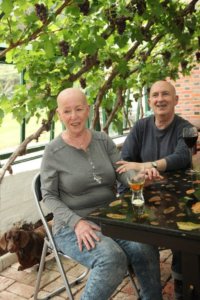 After two hundred and forty nine talks and interviews, sixty four films plus numerous walks, dramatic presentations, birthday toasts, dinners and much, much socialising, the Graham Greene International Festival in Berkhamsted is still going strong. And this year’s festival, which takes place 3-8 October 2024, will be the 25th – a Silver Anniversary of gatherings which reflects so well on the continuing dedication of the organisers and, of course, the lasting worldwide popularity of the author himself.
After two hundred and forty nine talks and interviews, sixty four films plus numerous walks, dramatic presentations, birthday toasts, dinners and much, much socialising, the Graham Greene International Festival in Berkhamsted is still going strong. And this year’s festival, which takes place 3-8 October 2024, will be the 25th – a Silver Anniversary of gatherings which reflects so well on the continuing dedication of the organisers and, of course, the lasting worldwide popularity of the author himself.
Very many writers, academics, celebrities, journalists and especially those who knew Greene personally have shared their memories, theories and knowledge in the various venues around the town but principally the historic Deans Hall, Berkhamsted Town Hall and the school’s Sixth Form Centre. There are too many to describe individually but below is a selection of the people and events which have been presented over the years.
The first film to be shown, at the inaugural festival in 1998 was – you guessed it – The Third Man.
The following year, 1999, Roy Boulting talked about the making of Brighton Rock (1947) with that disturbing depiction of Pinkie by Richard Attenborough. Fr. Leopoldo Duran spoke the same year on the theme, Graham Greene: Friend and Brother about his intimate relationship with the writer. [below right: Greene with Duran]
Another close personal friend of Greene’s, Bernard Diederich, who was strongly linked with Greene’s travels in Latin America, shared his personal reminiscences in 2001.
The writer Christopher Hampton talked about adapting Graham Greene for the cinema in 2002, having produced the screenplay of The Honorary Consul. Maria Couto, author of one of the most highly regarded literary studies of the author, Graham Greene: On the Frontier, spoke at the same festival.
The centenary of Greene’s birth, 2004, was naturally a special event. Norman Sherry, Greene’s official biographer, Louise Dennys his niece and Canadian publisher plus playwright John Mortimer were just some of the speakers who took part.
The following year, 2005, Marie-Francoise Allain, author of the book-length series of interviews, The Other Man: Conversations with Graham Greene described her experience of getting this most private and guarded man to talk openly about his life and work.
Dr. Michel Lechat, who ‘hosted’ Graham Greene at the leprosy centre in the Belgian Congo while the author was researching for his novel A Burnt-Out Case (1961), spoke about that experience in 2006.
Kate Adie, long-time journalist and BBC broadcaster, drew parallels between her own life and Greene’s while visiting the world’s most dangerous places, in a talk in 2009.
 The next year, 2010, psychoanalyst and some-time England cricket captain Mike Brearley [right] offered a professional view of Greene’s six month experience of treatment with Kenneth Richmond, an unqualified practitioner.
The next year, 2010, psychoanalyst and some-time England cricket captain Mike Brearley [right] offered a professional view of Greene’s six month experience of treatment with Kenneth Richmond, an unqualified practitioner.
Professor Carlos Villar Flor talked about the early stages of his research into Greene’s travels with Fr. Leopoldo Duran in Spain and Portugal in 2013. The result of Professor Flor’s exhaustive study has just been published in English by Oxford University Press.
Caroline Bourget and Nick Dennys, daughter and nephew of Graham, were interviewed together in 2016.
Journalist Sarah Rainsford, in 2019, spoke of her experiences as the BBC correspondent in Cuba and her search for traces of the old Havana which Greene knew so well which in turn led to the writing of one of his most popular novels, Our Man in Havana (1958).
In 2021, Dr. Andrei Gorzo presented a fascinating and very different perspective when he spoke about the impact Greene’s writing has had in his native country, Romania.
Finally, in 2023, mention must be made of Mike Hill’s talk about why the Nobel Prize for Literature was never awarded to Greene. Mike Hill [Below right] rewarded his audience with an insightful and informative talk having been given the minimum amount of notice when the scheduled speaker  suddenly dropped out.
suddenly dropped out.
And so to 2024. Festival director Richard Greene has nearly finalised his list of speakers (so keep checking this site) and he is currently working on which films are to be shown at the regular Thursday and Friday evening slots. The show goes on and all credit must be given to those who originally conceived the idea of a festival and made this wonderful yearly event actually take place – including the long-time Chair of the Graham Greene Birthplace Trust, Giles Clark. [Below left with his late wife Julia]. Thank you Giles and thank you to all those who have contributed year on year to sustain interest in Graham Greene, his life and his works. 